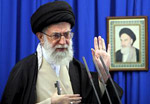 Reuters: One of the chief beneficiaries of this week’s easing of Iranian sanctions is the country’s ruler – Supreme Leader Ayatollah Ali Khamenei. Khamenei controls a massive business empire known as Setad.
Reuters: One of the chief beneficiaries of this week’s easing of Iranian sanctions is the country’s ruler – Supreme Leader Ayatollah Ali Khamenei. Khamenei controls a massive business empire known as Setad.
By Steve Stecklow and Babak Dehghanpisheh

(Reuters) – One of the chief beneficiaries of this week’s easing of Iranian sanctions is the country’s ruler – Supreme Leader Ayatollah Ali Khamenei.
Khamenei controls a massive business empire known as Setad that has invested in Iran’s petrochemical industry, which is now permitted to resume exports. Under a six-month deal between Iran and world powers, Tehran has promised to scale back its nuclear development program in exchange for the suspension of certain economic sanctions, including curbs on the export of petrochemicals.
On Monday, the day the suspension of the restrictions took effect, the U.S. Treasury Department published a list of 14 Iranian petrochemical companies that previously had been sanctioned but are now permitted to do business abroad. The list includes three firms that the department said last year are controlled by Setad – Ghaed Bassir Petrochemical Products Co, Marjan Petrochemical Co and Sadaf Petrochemical Assaluyeh Co.
In an emailed statement to Reuters, a spokesman for Setad said it only held shares in Ghaed Bassir Petrochemical. “Our investment … in the petrochemical sector is minimal,” the spokesman said.
The easing of sanctions comes less than seven months after the Treasury Department added Setad and 37 companies the department said Setad oversees – including the three petrochemical firms – to a lengthy list of sanctioned Iranian entities. The Treasury described the action last June as an effort to target Iran’s leadership, and it accused Setad of being part of a scheme to circumvent U.S. and international sanctions.
In November, Reuters published a three-part series (www.reuters.com/investigates/iran/) that detailed for the first time how Setad had become one of Iran’s richest and most powerful institutions, largely through the systematic seizure and sale of thousands of properties belonging to ordinary Iranians. By the time Washington sanctioned Setad, it had morphed into a multi-billion-dollar business conglomerate that now holds stakes in nearly every sector of Iranian industry, including finance, oil and telecommunications.
Iran’s state news agency denounced the Reuters reports as “disinformation” intended to undermine public trust in the Islamic Republic’s institutions.
The conglomerate’s full name in Persian is Setad Ejraiye Farmane Hazrate Emam. Khamenei, who appoints its board of directors, is Iran’s top cleric and has final say on all governmental matters, including the preliminary nuclear accord. Iran and six powers – the United States, Russia, China, Britain, France and Germany – will try to reach a final agreement over the next six months. The West believes Iran wants to build atomic weapons. Iran has long said its nuclear program is for peaceful energy development.
Setad stands to profit from the preliminary agreement in ways besides the export of petrochemicals. The agreement makes it easier for Iran to import humanitarian goods, including medicine. Setad controls numerous Iranian pharmaceutical companies.
Washington targeted Iran’s petrochemical industry last year, with an Obama administration official saying the sector had become a significant source of Iran’s foreign earnings.
In an interview with Reuters this week, a Treasury Department official estimated that Iran would generate at most $1 billion in revenue from petrochemical exports over the next six months, and possibly much less, since it would not be in a position to sign any long-term contracts.
Dozens of petrochemical products are no longer under sanctions, including ammonia, methanol and chlorine. The suspension does not include finished products, such as plastic bags or tires. U.S. citizens and American-owned companies are still prohibited from doing most business with Iran.
The website of Ghaed Bassir Petrochemical, which makes plastic products, states that it has exported material to numerous countries, including South Africa, Italy, Britain, Germany, Turkey, Egypt, South Korea and China. A Setad subsidiary, Tadbir Energy Development Group, states on its website that it owns 80 percent of Ghaed Bassir.
An employee at Ghaed Bassir said company officials were not immediately available for comment.
Last June, the Treasury Department said Setad also controls Marjan Petrochemical, which is investing in methanol production, and Sadaf Petrochemical Assaluyeh, which makes rubber.
An official with Marjan told Reuters that “the sanctions didn’t hurt us very much.” He said the company plans to continue discussions it has had in the past with companies in Italy and Denmark. “We’re still in the planning phase,” he said.
(Reporting by Steve Stecklow in London and Babak Dehghanpisheh in Beirut. Edited by Simon Robinson)


